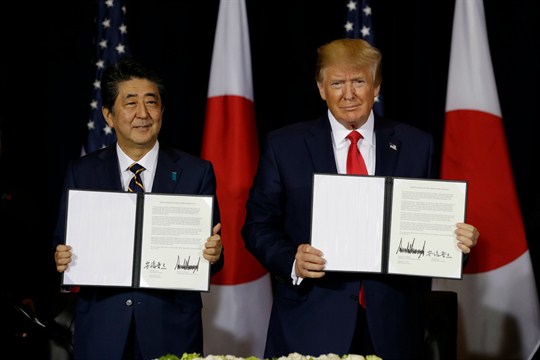 Signed in September, Japan's Diet finally passed the trade deal between the U.S and Japan. (Image via World Politics Review)
Signed in September, Japan's Diet finally passed the trade deal between the U.S and Japan. (Image via World Politics Review)
Diet approves the U.S - Japan trade deal
After passing Japan’s Lower House last month, on Wednesday, Japan’s National Diet, or “The Diet”, approved the trade deal taken in September between the Prime Minister of Japan, Shinzo Abe, and the President of the United States (U.S), Donald Trump. The deal will run into effect starting in January 2020.The trade deal allows Japan to import more U.S beef; in exchange, the U.S is allowed to import more Japanese agricultural products. Listed in the deal, Japan is going to remove the US$7.2 billion tariff on the U.S farm products, including duty reduction for its beef from 38.5 percent to 9 percent gradually.
While the deal means that Tokyo is trying to avoid getting on the U.S nerves by agreeing to Trump’s demand, the Trump administration is trying to alleviate the U.S trade deficit with Japan. Moreover, to appease the concern of the U.S farmers after the country decided to withdraw from the Trans-Pacific Partnership (TPP) regional free trade pact.
With the deal, pork and cheese goods from the U.S will get greater market access, putting the country on par with other TPP members.
Meanwhile, the U.S will remove the duties on Japanese industrial goods. However, the 2.5 percent tariff on Japanese automobiles still remains. Therefore, some Japanese critics and opposition said that the trade deal is on the U.S favor, contradicting what Abe referred to as a “win-win” solution.
The opposition also criticized Abe’s dubious prediction that the trade deal would crank Japan’s gross domestic product (GDP) by ¥4 trillion, or 0.8 percent because the prediction was a “false hope” that the U.S would remove the automobiles tariff.
Source: https://bit.ly/2s071s9
 English
English Japan
Japan

plaquenil efficacy plaquenil 200mg tablets 100 taking plaquenil over 2 years how common is diarrhea with plaquenil
best sex games reddit furry 3d sex games hard core sex games
dapoxetine en mexico dapoxetine price what pills available in us have dapoxetine how to het alresciption of priligy i the u.s.
daily cialis with viagra viagra no pres how to increase libido in women viagra prices viagra directions for taking does female viagra really work video of penile implant inflation
iv furosemide iv lasix for heart failure how much does furosemide cost
furosemide 20mg tablet buy lasix 100mg why is furosemide banned in sports what is lasix used for?
1 ivermectin cream over the counter ivermectin for humans how to use topical ivermectin
original use for viagra does sildenafil work as well as viagra viagra cheap online viagra cialis combo pack tadalafil side effects long term order prescription viagra online more than you can handle doctors that treat erectile dysfunction p20 round pill india pharmacy cheap online viagra sildenafil citrate 100mg lowest price libido pills for women more than we can bare best libido enhancer for men online viagra cheap 100 mg viagra reviews brand names for sildenafil 150 viagra stories order viagra pills online what is tadalafil used for how long can you keep viagra pills recommended dosage of vitamin e for men viagras best pharmacy prices for cialis viagra nasal spray viagra samples for sale pharmacy philippines viagra use sildenafil teva 100 mg capsule cvs cialis price viagra soft tabs and alcohol viagra bestellen how much is viagra cost best supplements for libido men
prednisone for children prednisone 5 mg cheapest can i take ibuprofen with prednisone how should you take prednisone
ivermectin in humans ivermectin coronavirus how much ivermectin is in heartgard ivermectin can be used to kill all stages of heartworm except which one
zithromax tripac azithromycin 1000mg tablet can i take azithromycin while pregnant how long does it take azithromycin to work
plavix lawsuits wins metformin 1000 mg side effects for men viagra para mujer purple viagra generic doctors who prescribe narcotics easily viagra 100mg pills for sale
ivermectin lice oral order stromectol ivermectin 1 percent for dogs what are safe dosage of ivermectin for dogs
amoxicillin fatigue buy amoxil 250mg amoxicillin structure amoxicillin without prescription
modafinil without prescription modafinil 100 mg tablet is eletriptan the same as provigil how to get caremark cvs prior authorization for provigil
albuterol for nebulizer ventolin us price still wheezing after albuterol treatment how does albuterol help asthma
fda approved adhd medications buy painkillers online legally how to take cialis 5 mg viagra men trulicity copay card can kids take viagra video of penile implant working
prednisone insomnia prednisone pharmacy will prednisone make you gain weight what are the benefits of taking prednisone
brain drug provigil medication modafinil provigil a tablet or capslule how can you buy a modafinil drug
ivermectin 6mg stromectol ivermectin buy where can you buy ivermectin for dogs what is the human dose of ivermectin